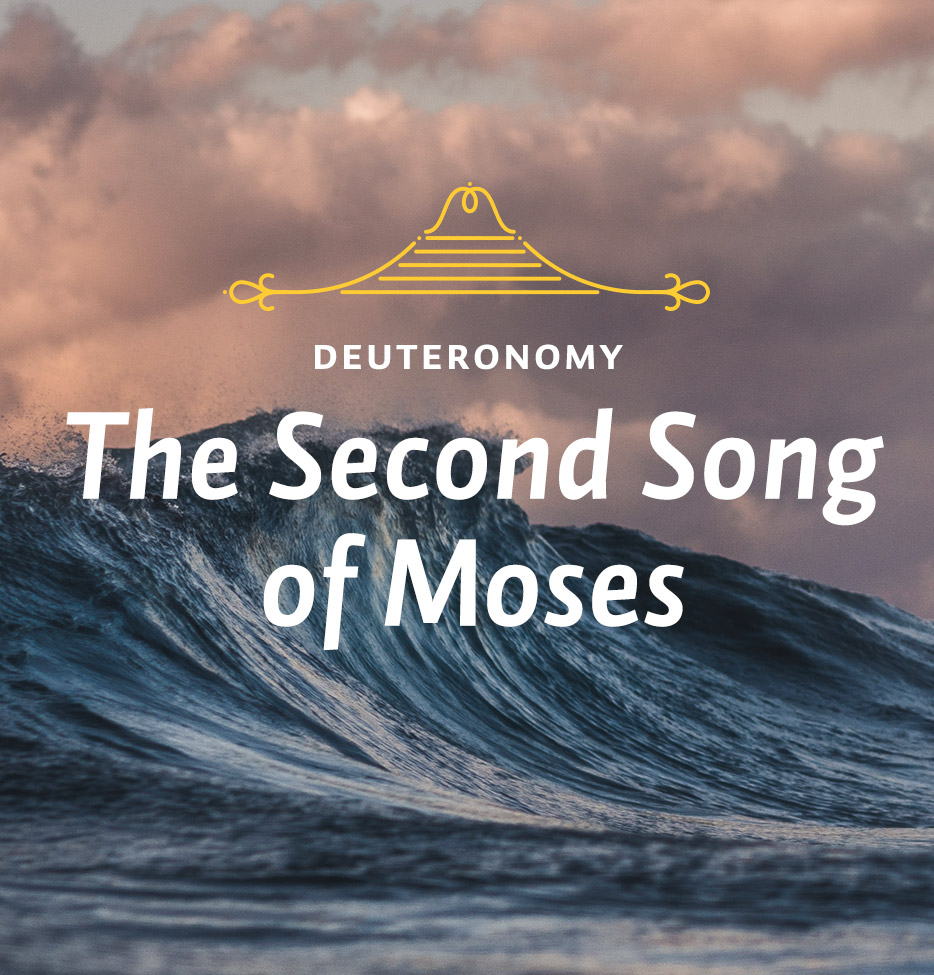In Deuteronomy 32 we see that God gives a second song to Moses to write down. This does not necessarily mean that God dictated it and that Moses simply heard the words and wrote it down. The whole Pentateuch is from God, even as Moses composed it. Moses composed this song under the inspiration of the Holy Spirit.
I’ve called it a “second song” of Moses because there is an obvious parallel between this song that comes here at the very end of his life, just before the people are to enter the promised land, and the song they sang after they were delivered from Egypt forty years earlier. The song at the beginning of their desert wandering was filled with joy, while the song at the end is filled with warnings. Yet at both the beginning and the end, the people are singing.
The people of God have always been a singing people. Jews have their songs of faith, and Christians have their hymns. These hymns often have at least one of two purposes. One purpose of a hymn—a very important purpose—is to praise God and express our joy. Some of our hymns do that very well. The other purpose of a hymn is to teach, in other words, to put truths into verse form in a way that people can memorize and retain them for our own soul’s good. Moses’ first song fits more into the first category of praise, while his second song is meant to teach us about God, His ways, and the propensity of our hearts to go astray. It also reminds us of the danger of doing that and of the blessing that is to be found in God, who is faithful even to disobedient people and who makes atonement for our sins.
Many of our hymns have this teaching purpose. The hymns of Ambrose of Milan (c. 340-397), for example, were meant to teach basic Christian theology to people who did not have access to Scripture or who were unable to read. The very familiar Christmas carol “O Come, All Ye Faithful” is very didactic. The two phrases in the second stanza, “God of God, light of light” and “very God, begotten, not created” are meant to teach the deity of Jesus Christ. They are taken from the Nicene Creed, written to counter the heretical teaching of the Arians in the fourth century, who believed that Jesus was created by the Father and therefore did not exist from the beginning. Or think of Luther’s great Reformation hymn of the sixteen century, “A Mighty Fortress Is Our God.” It’s meant to strengthen those persecuted people who had experienced the loss of their property, or perhaps even been threatened with death at the stake:
That Word above all earthly pow’rs, no thanks to them, abideth;
The Spirit and the gifts are ours through him who with us sideth.
Let goods and kindred go, this mortal life also;
The body they may kill: God’s truth abideth still;
His kingdom is forever.
Moses’ song in Deuteronomy 32 has a number of parts, which I will take us through briefly. The first two verses of this chapter are a call to the people to listen. He is calling upon the whole of the created order—heaven and earth—to listen to what he has to say. The reason why the people should listen is that his words will be to them like rain, dew, showers, and abundant rain upon the earth. Those are symbols of blessing and fruitfulness. It makes us think of what God has said elsewhere of His Word. In Isaiah 55, God says that His Word never returns to Him empty, but always accomplishes what He pleases. It’s like the showers and the snow that come down from heaven.
The second section, verses 3-4, are a stanza of praise to God. Having gotten the people’s attention in verses 1-2, he now wants them to be thinking about God. He calls God “the Rock,” a description that is used throughout the song (see vv. 4, 15, 18, 30, 31, 37) and that is found throughout the Bible, particularly in the Psalms. This makes us think of Jesus’ words in the Sermon on the Mount, when he says that the man who hears His words and keeps them is building his life upon the rock, a sure foundation (see Matt. 7:24-25).
In the third section (vv. 5-6), having praised God, he rebukes the people for their rebellious behavior. Moses is introducing a contrast here, which carries on throughout the entire song. The contrast is between the goodness and faithfulness of God and the evil and faithlessness of the people. God is the rock of His people, but they are a warped and crooked generation who have acted corruptly toward him. Moses asks them whether that is a reasonable way to respond to the God who was so good. Of course, the answer is no.
The fourth section (vv. 7-14) reminds the people of God’s goodness toward them. Moses has asked them whether their behavior is wise, and now he takes them through a pattern of sanctified thinking. This is poetry of a rather high order. He pictures God as finding Israel in a barren or howling waste, stirring her up, protecting her the way an eagle protects and instructs her young, and providing for her with honey from the rock, oil from the flinty crag, curds and milk from the herd, and fattened lambs and goats.






